Picture
Your Present Location: HOME> Picture-
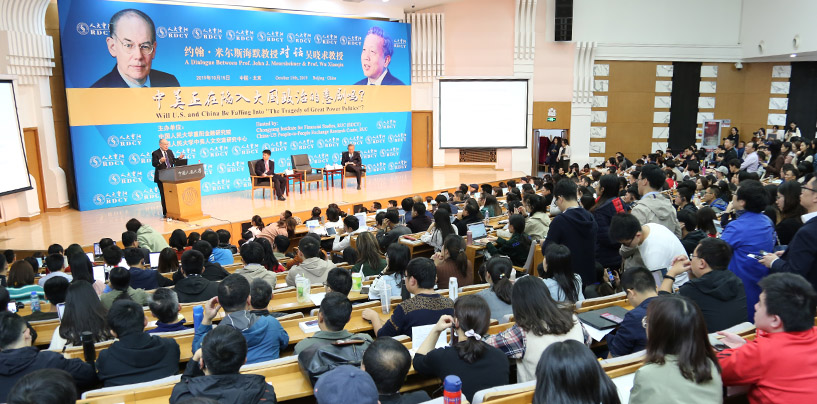
A dialogue between John J. Mearsheimer and Wu Xiaoqiu: China's rise is unstoppable!
On October 15, the 45th Chongyang Forum, which was sponsored by the Chongyang Institute for Financial Studies, Renmin University of China (RDCY) and China-US People-to-people Exchange Research Center, RUC, invited John J. Mearsheimer, the founder of the "Offensive Realism" and R. Wendell Harrison Distinguished Service Professor in Political Science at the University of Chicago to dialogue with Wu Xiaoqiu, Vice President of Renmin University of China and First Class Professor (Finance) about Are China and the United States involved in 'The Tragedy of Great Power Politics'.
2019-10-22 -
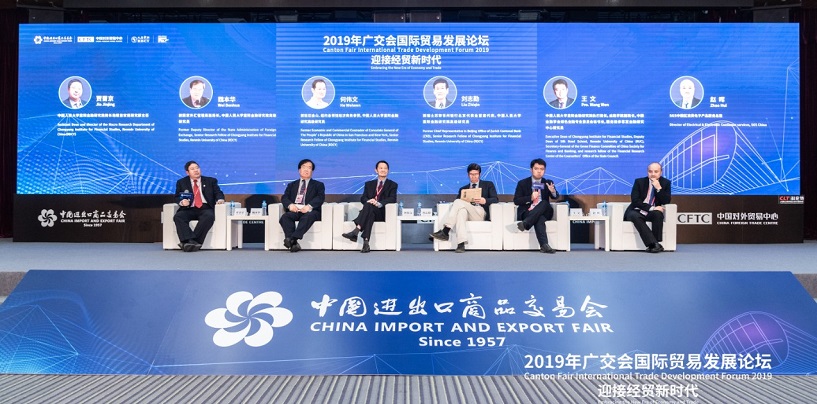
RDCY hosted Canton Fair International Trade Development Forum 2019
On Oct. 16th, with the theme of “Embracing the New Era of Economy and Trade”, Canton Fair International Trade Development Forum 2019 was held in Guangzhou. It sponsored by China foreign trade center and organized by Chongyang Institute for Financial Studies, Renmin University of China (RDCY). More than 400 representatives from global think tanks, finance, commerce, trade and other fields gathered to discuss new business forms and opportunities in international finance and trade. The forum was presided over by Guan Zhaoyu, the researcher fellow of RDCY.
2019-10-18 -
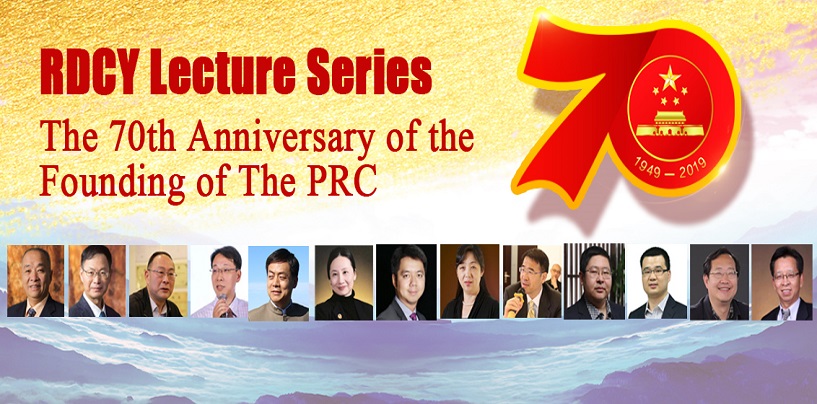
RDCY Lecture Series 9: The 70th Anniversary of the Founding of The PRC
"The 70th Anniversary of the Founding of The PRC" series is hosted by Chongyang Institute for Financial Studies of Renmin University of China (RDCY) and Huanqiu Web. The lecture series was specially planned by RDCY for the 70th anniversary of the founding. And The series of lectures invited 13 authoritative scholars from Renmin University of China to sort out the 70 years' development history and changes, to appraise brilliant achievements and practical experiences, and look forward to the future.
2019-10-15 -
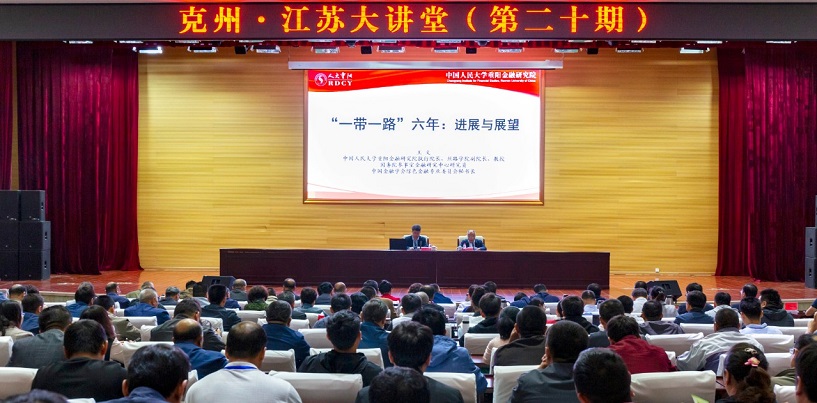
RDCY gave lectures and did research investigation in Kezhou, Xinjiang
From October 7 to 9 2019, on the occasion of the 70th Anniversary of the Founding of People’s Republic of China, Prof. Wang Wen, the Executive Dean of Chongyang Institute for Finance Studies, Renmin University of China(RDCY) was Invited by the Party Committee of Kizilsu Kirgiz (Kezhou) Xinjiang to give lectures on "Belt and Road Initiative"(BRI). Kezhou is the westernmost prefecture-level administrative region of China.
2019-10-12 -
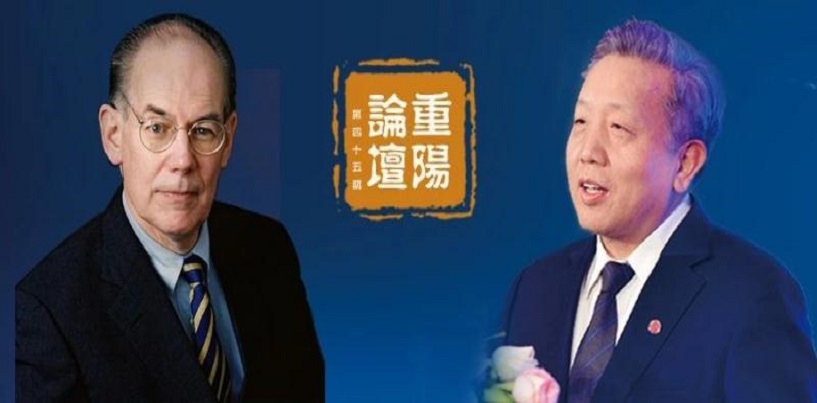
Mr. John J. Mearsheimer Dialogues with Professor Wu Xiaoqiu on Sino-US relations
R.Wendell Harrison Distinguished Service Professor in Political Science at the University of Chicago Mr. John J. Mearsheimer Dialogues with Professor Wu Xiaoqiu: Are China and the United States involved in “The Tragedy of Great Power Politics” ?
2019-10-11 -
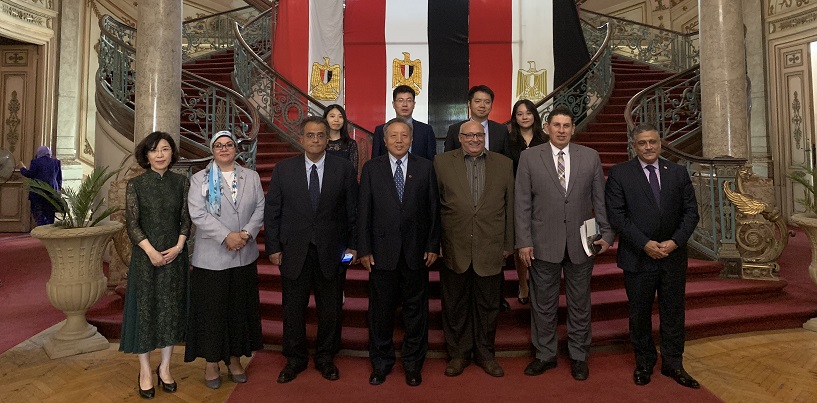
The Vice-President of RUC Leads Delegation to Visit Egypt, Ethiopia and Zimbabwe
From September 17th to September 24th, RUC Vice-President, Wu Xiaoqiu, led a delegation to visit Egypt, Ethiopia and Zimbabwe. The delegation visited The Chinese Embassy in Egypt,The Chinese Embassy in Zimbabwe, Egyptian Council for Foreign Affairs(ECFA), Ain Shams University, Ethiopia’s HuaJian Group’s International Industrial Factory, University of Zimbabwe, Confucius Institute at the University of Zimbabwe and other places of education. The delegation surveyed the different universities and committees, observed the students, and strengthened the cultural understanding and relationship between China and these three African countries.
2019-09-29 -
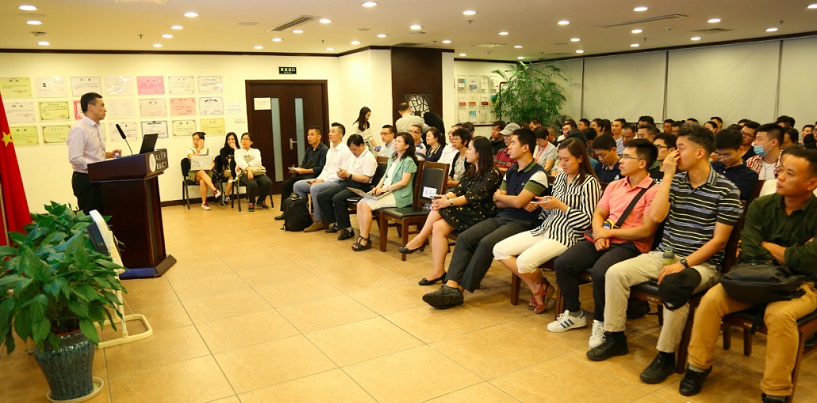
Mao Jiye: How do traditional enterprises drift to digits?
Digitalization is an important way for enterprises to transform and upgrade, which will have a subversive impact on future development. But only 7% of China's enterprises have achieved digital transformation. Why is it so difficult? How can we achieve digital transformation? On September 17, Mao Jiye, Dean of the School of Business of Renmin University of China, delivered a lecture at Chongyang Institute for Financial Studies of Renmin University of China (RDCY).
2019-09-27 -

70 Years through Foreigners' Eyes
To mark the PRC's 70th founding anniversary, CGTN has introduced a special series "70 Years through Foreigners' Eyes." There are several episodes written by several non-resident senior fellows at the Chongyang Institute for Financial Studies, Renmin University of China (RDCY) to share their views on China's achievement in the past seven decades.
2019-09-27 -
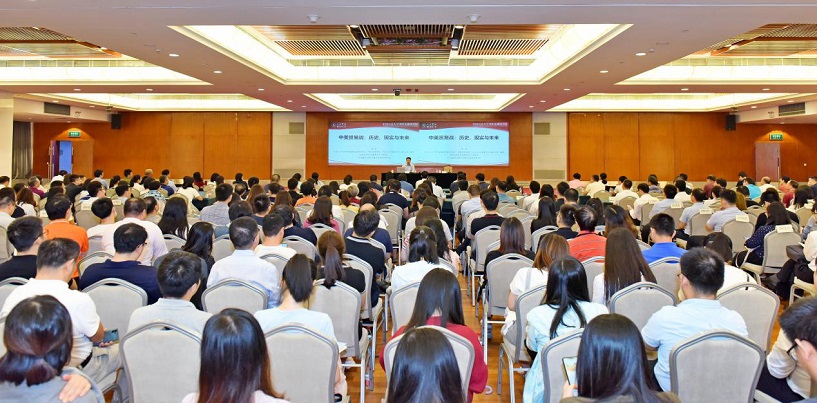
RDCY intensive investigation on 3 cities in Pearl River Delta
From August 29, 2019 to September 2, 2019, Wang Wen, Executive Dean of Chongyang Institute for Financial Studies of Renmin University of China (RDCY) (RDCY), and Bian Yongzu, Research Fellow of RDCY, and Zhu Baobao, Research Assistant of Research Cooperation Department formed a research team. The research team conducted in-depth research in Guangzhou, Dongguan and Shenzhen. During the investigation, Dean Wang Wen also held four lectures arousing enthusiastic response at the invitation of government, associations and universities.
2019-09-06 -
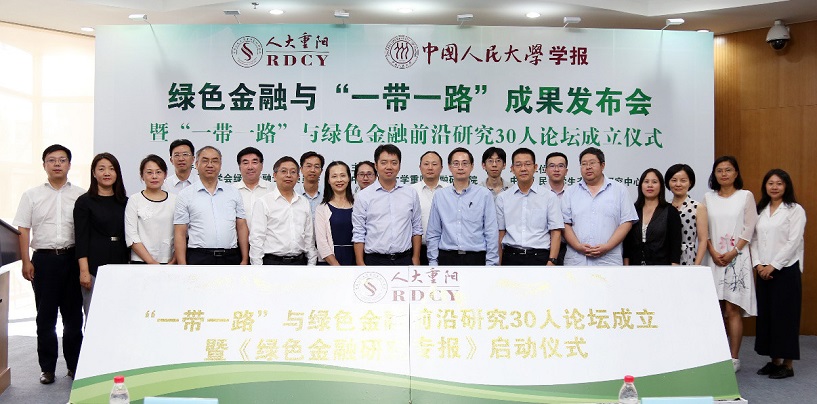
“B&R” and Green Finance Frontier Research 30-Person Forum established in Beijing
On August 21st, hosted by Chongyang Institute for Financial Studies of Renmin University of China (RDCY) and "Journal of Renmin University of China", and co-organized by the Center for Eco-Financial Studies of Renmin University of China, the launching ceremony of green finance and "Belt and Road" (B&R) results as well as the founding ceremony of the “B&R” and Green Finance Frontier Research 30-Person Forum was held at Renmin University of China.
2019-08-28 -
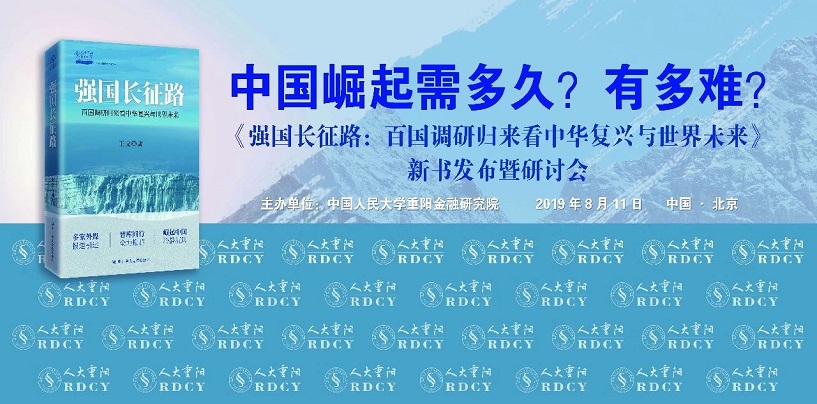
RDCY new book "Great Power’s Long March Road" received high praises from the experts
On August 11th, Launching Ceremony and Seminar on the book Great Power’s Long March Road: The views of China's rejuvenation and the future of the world after hundred countries’ visit (Wang Wen) was held at Remin University of China. Li Zhaoxing, Hu Xijin, Zhang Yanling, Chen Wenling, Cui Xiantao, Jin Canrong and more than 20 celebrities and 300 guests attended the seminar. Yang Rui presided over the Book Release and Kytone Speech.
2019-08-16 -
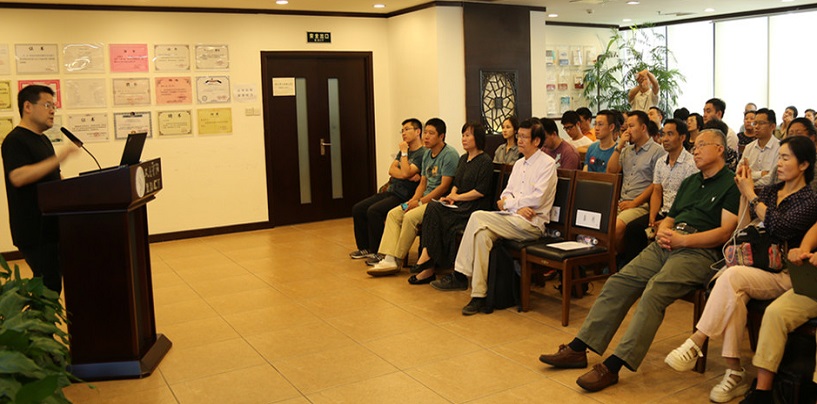
Qin Shuo: The success of Chinese enterprises depends on entrepreneur spirit with the feeling of nation
Commercial civilization is a vital aspect in the development of China's market economy. What kind of social responsibility should enterprises undertake in the new era? On July 22nd, Qin Shuo as a guest to deliver a lecture at Chongyang Institute for Financial Studies of Renmin University of China (RDCY) and gave an in-depth explanation of the close relationship between commercial civilization and social progress.
2019-08-13 -
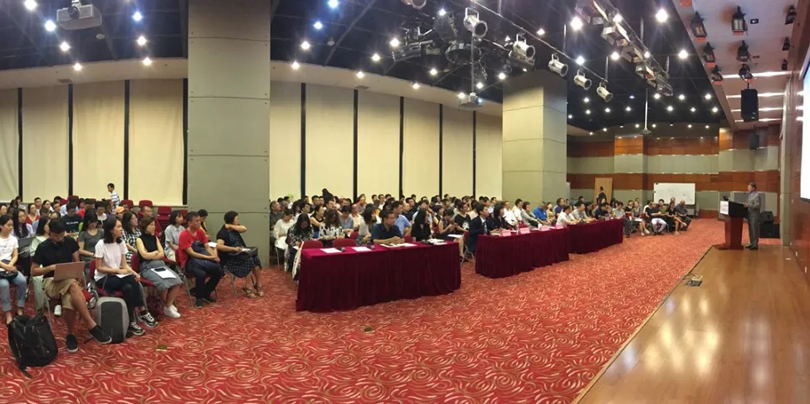
Zhao Suisheng: China and US will both benefit from peaceful coexistence, lose from conflicts
Since last year, the United States has imposed a series of trade sanctions against China, and great changes have taken place in Sino-US relations after more than 40 years of ups and downs. Is China-US trade friction a "Trump phenomenon" or a "new normal" in relations in the future? In this regard, Mr. Zhao Suisheng, a tenured professor at the Joseph Korbel School at the University of Denver, was invited to deliver a lecture at Chongyang Institute for Financial Studies of Renmin University of China (RDCY) on July 20 and make an in-depth analysis on the US strategy towards China and the future of China-US relations.
2019-08-07 -
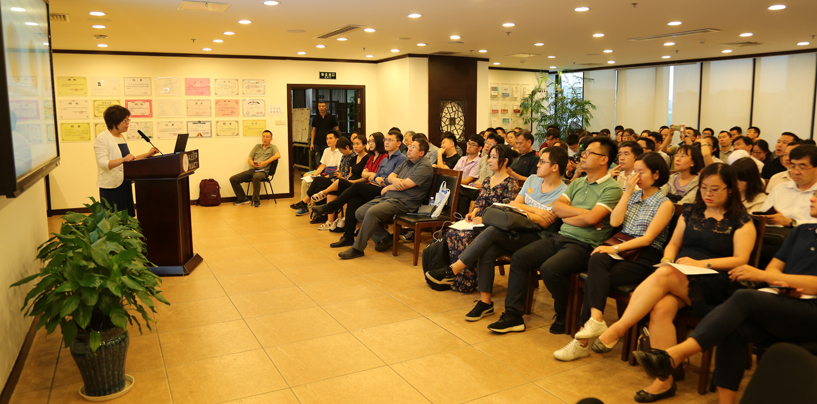
Wen Qiuhong: Is the golden age of new energy coming?
The changes of energy structure are happening around the world and China, which are called “Something Unseen in a Century”. Considering that the basic connotation of energy is changing, it is necessary to think about whether the new energy revolution is coming? On July 16, Wen Qiuhong, chief engineer of CNOOC Research Institute, delivered a lecture at the Chongyang Institute for Financial Studies of Renmin University of China, deeply interpreting the current situation and future of China's new energy development.
2019-07-25 -
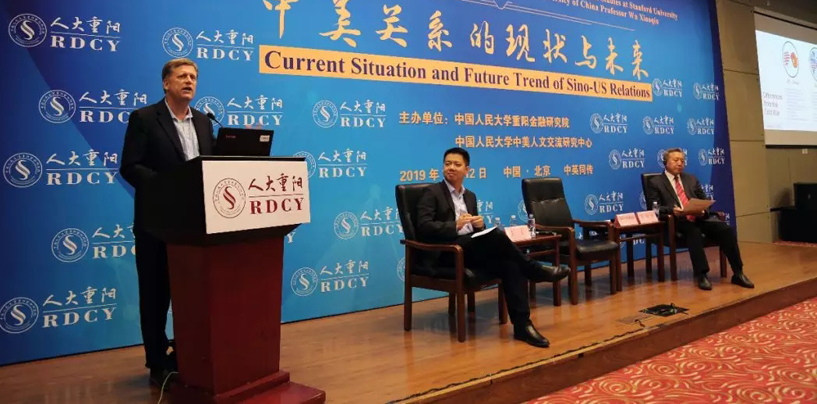
Former US ambassador to the Russia dialogues with Wu Xiaoqiu on Sino-US relations
On July 12th, Michael A. McFaul, Former US Ambassador to Russia and Director of Freeman Spogli Institute for International Studies at Stanford University, delivered a lecture with the theme of “Current Situation and Future Trend of Sino-US Relations”at Chongyang Institute for Financial Studies of Renmin University of China (RDCY), and had a dialogue with Professor Wu Xiaoqiu, Vice president of Renmin University of China. The dialogue was moderated by Wang Wen, Executive Dean of RDCY.
2019-07-23 -
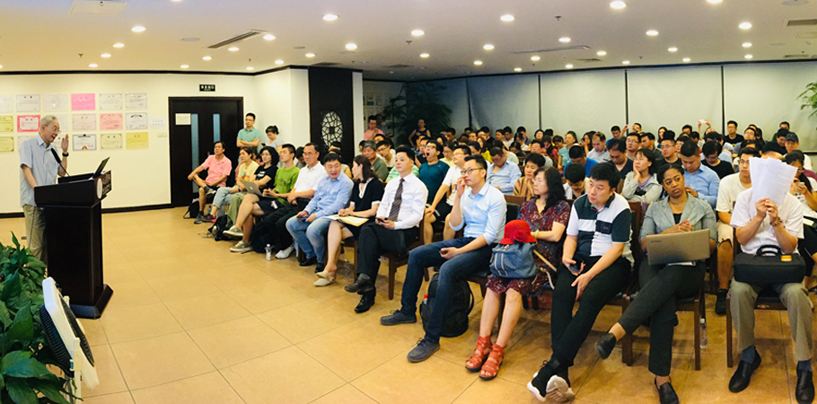
Zhang Baijia: Changes of China’s Diplomatic Concepts in the Past 70 Years
How to evaluate the interaction between China and the world in the 70 years after the foundation of People’s Republic of China? On July 4, Professor Zhang Baijia, former deputy director of Party History Research Center of the CPC Central Committee, was invited to deliver a lecture and review the changes of diplomatic concepts in the past 70 years.
2019-07-18 -
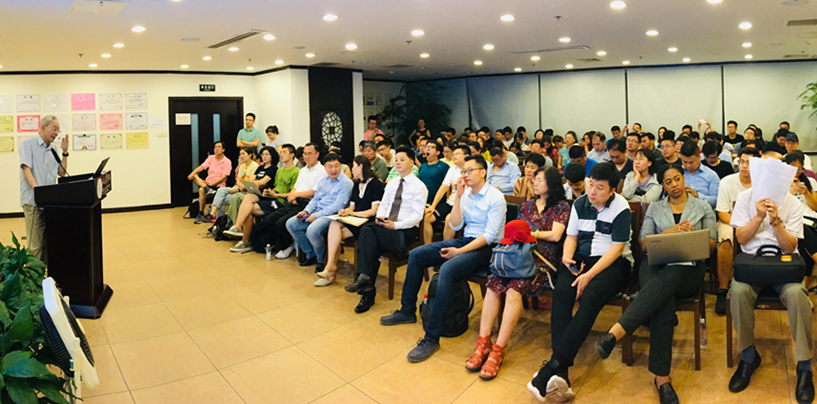
Zhang Baijia: Changes of China’s Diplomatic Concepts in the Past 70 Years
How to evaluate the interaction between China and the world in the 70 years after the foundation of People’s Republic of China? On July 4, Professor Zhang Baijia, former deputy director of Party History Research Center of the CPC Central Committee, was invited to deliver a lecture and review the changes of diplomatic concepts in the past 70 years.
2019-07-18 -
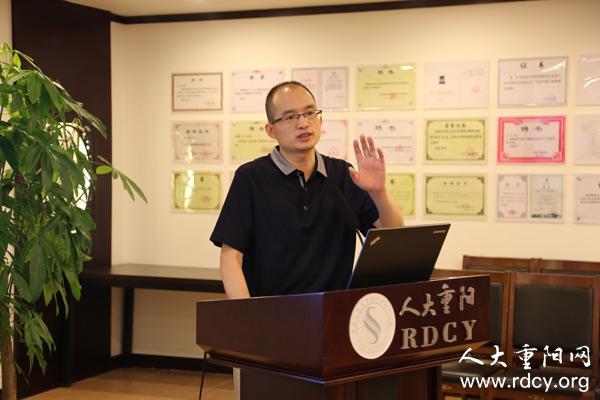
A report on “Chinese Enterprises Tax Burden- Based on Data of Listed Companies" releases in Beijing
On July 9, a report on “Chinese Enterprises Tax Burden- Based on Data of Listed Companies" and the theme seminar on "panoramic view of China's tax burden" were successfully held in Chongyang Institute for Financial Studies at Renmin University of China (RDCY).
2019-07-15 -
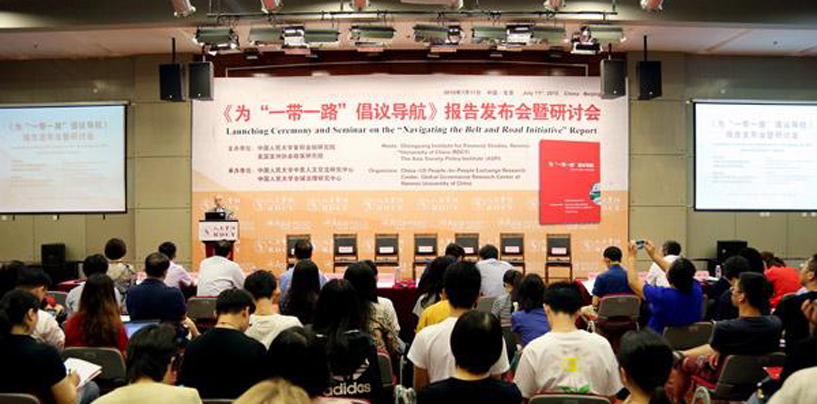
A BRI report written by former US senior official released in Beijing
On July 11, co-hosted by Chongyang Institute for Financial Studies, Renmin University of China (RDCY) and The Asia Society Policy Institute (ASPI), a launching ceremony and seminar on the report“Navigating the Belt and Road Initiative” was held. Based on the ASPI's investigation research on the countries along the "Belt and Road" , the report positively evaluates the original intention and significance of the BRI, and puts forward 12 policy recommendations. The English version of the report was written by Daniel Russell, former assistant secretary of state of the United States and vice president for International Security and Diplomacy at the ASPI, and Blake Berger, a senior program officer at the ASPI. The Chinese version was translated and released by the RDCY.
2019-07-12 -
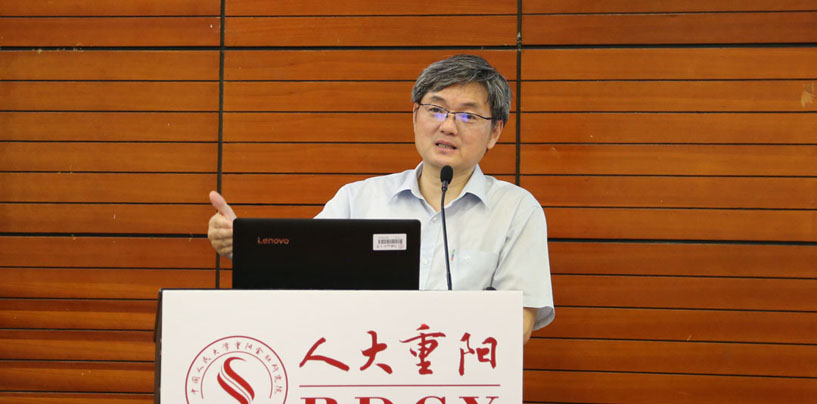
Yang Ruilong: logic, dilemma and future directions of China’s SOEs reform
On July 3, 2019, Yang Ruilong, a professor at Renmin University of China, was invited to deliver a lecture sharing " Evolution and reflection of the Logic of State-owned Enterprise Reform (SOEs)".
2019-07-10
























































































 京公网安备 11010802037854号
京公网安备 11010802037854号





